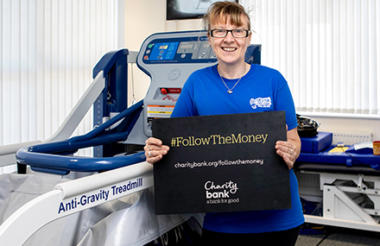At Charity Bank, we’re currently running our Follow the Money campaign, which encourages charities, businesses and individuals to move some of their savings or reserves to an ethical provider.
The campaign reminds people that savings do not exist in a vacuum – they have real-world impact.
In the search for high returns, banks invest and lend their savers’ money around the globe. Sometimes money may be used in ways that you might view as inappropriate, against your mission and values.
Charity savings could be invested in factory farming, support the gambling industry or the production of tobacco or weapons.
The campaign calls on charities, businesses and individuals to move some of their reserves to an ethical provider where their money may be channelled into the social sector, whilst earning a financial return.
Public perception
While there are some well publicised examples of charities unwittingly investing their reserves in ways that contradict their mission, there are also a growing number of charities and social enterprises that deliberately invest in ways that support their values and deliver benefits for society.
This is part of a wider shift within the sector, with a growing number of organisations moving away from commercial offerings, instead looking to procure services from within the social sector.
The public is increasingly demanding more from both businesses and charities and are using their spending power to support those that act ethically. Research we recently carried out revealed that 7 in 10 people think charities should invest their savings and investments ethically. And more than half (57%) said they prefer to buy from businesses that act ethically.
Make money and make a difference
It’s easy to dismiss the possibility of achieving a social return as well as a financial return on your investments but saving ethically offers the chance to do both. Responsible finance providers like Charity Bank demonstrate that doing good and making sound business decisions are not mutually exclusive.
By choosing to save your money ethically, as well as earning a competitive return, your money can make a real difference to the social sector increasing your charity’s impact. In the case of Charity Bank, your savings could support homeless adults, help maintain a valuable community hub or provide specialist care to people with a life-limiting illness.
Charities supporting charities
The existence of ethical banks like Charity Bank allows charities and social enterprises to borrow at reasonable rates with a bank who understands the sector, helping them to innovate, grow and become sustainable.
By putting your money where your values are and choosing to bank ethically, you’re not only ensuring that your finances remain in line with your own charity’s ethos but are also empowering other charities to make a greater impact.
Justin Hort is head of savings at Charity Bank
Several socially motivated banks exist in the UK. One example is Charity Bank, which is owned by and dedicated to charities and social purpose organisations.
The Charity Bank Follow the Money campaign, now in its 10th year, shows how money saved with them is being used to support charities and social enterprises.
Launched a decade after the global financial crisis, the campaign will see 38 of the charities and social enterprises supported by Charity Bank loans open their doors to showcase how money saved with an ethical provider can have a positive impact on society.
This year’s tour started at the beginning of September and its end coincides with Good Money Week, 29th September – 5th October.
The campaign is backed by social sector leaders including NCVO, Social Enterprise UK, NAVCA and Locality.
Follow your money
This is an advertising feature.









